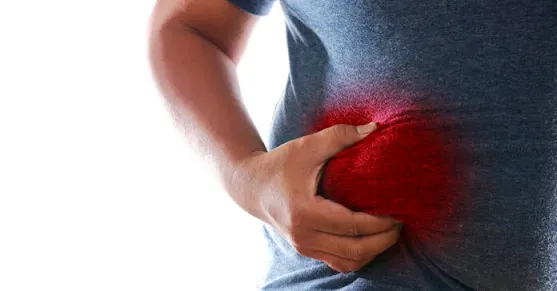Fatty liver doesn’t happen overnight — but these habits and conditions increase your risk:
Obesity
Excess belly fat increases liver stress
Sugary diets
High fructose corn syrup and soda overload the liver
Insulin resistance / Type 2 Diabetes
Increases fat buildup in liver cells
High cholesterol and triglycerides
Leads to fat accumulation
Excessive alcohol consumption
Damages liver function over time
Rapid weight loss or malnutrition
Can also contribute to liver issues
Pregnancy-related acute fatty liver
Rare but serious condition during pregnancy
And while some people have a genetic predisposition, lifestyle remains the biggest player — making prevention and reversal possible with the right choices.
🚨 Signs & Symptoms: When Your Liver Whisper Becomes a Cry
In early stages, fatty liver often shows no symptoms — which is why it's frequently found during routine blood work or imaging.
However, as the condition progresses, warning signs may appear:
Fatigue
Often mistaken for normal tiredness
Mild abdominal discomfort
Especially in the upper right side
Jaundice
Yellowing of skin or eyes — sign of advanced liver strain
Weakness or confusion
Indicates toxin buildup due to reduced liver function
Dark urine or pale stools
Sign of impaired bile flow
Easy bruising
Liver struggles to produce clotting proteins
If you're experiencing any of these regularly — especially alongside high liver enzymes (ALT/AST) — it’s worth asking your doctor for a deeper look at your liver health.
🔬 How Doctors Diagnose Fatty Liver
Diagnosis typically begins with:
Liver enzyme tests (ALT, AST)
Ultrasound or FibroScan to measure fat and stiffness
In some cases, a liver biopsy for confirmation
The goal isn’t just to catch it early — it’s to understand whether it’s alcoholic or non-alcoholic — and how far it has progressed.
🍽️ Prevention Starts With Your Plate
Your liver is like a filter — constantly working to process what you eat, drink, and expose yourself to daily.
So, feeding it well is key.
The Liver-Friendly Diet:
Leafy greens
Rich in antioxidants and fiber
Whole grains
Helps regulate blood sugar and digestion
Lean proteins
Eases burden on liver metabolism
Healthy fats (avocado, olive oil, nuts)
Supports cell membranes and detoxification
Berries and citrus
Full of flavonoids and vitamin C
Green tea
Contains EGCG, a powerful antioxidant
Garlic
May help reduce fat buildup in the liver
Avoid:
Sugary drinks (especially soda and energy drinks)
Fried foods and trans fats
Processed meats and refined carbs
Alcohol (especially in AFLD cases)
✅ Pro Tip: Think of your liver as a sponge — it absorbs everything you feed it, both good and bad.
🏃♀️ Exercise: Your Best Friend Against Fat Buildup
Physical activity plays a crucial role in managing fatty liver disease.
Even moderate movement helps:
Reduce liver fat
Improve insulin sensitivity
Support healthy weight management
Aim for:
150 minutes of moderate exercise per week (walking, swimming, yoga)
Add strength training 2–3 times per week to build muscle and improve metabolism
You don’t need intense workouts — just consistent motion.
Because when it comes to your liver…
Movement is medicine.
⚖️ Weight Management – More Than Just Numbers
Losing even 5–10% of body weight can significantly reduce fat in the liver.
But the way you lose matters.
Rapid weight loss can harm the liver
Gradual, sustainable changes are safest
Focus on:
Balanced meals
Portion control
Mindful eating
Reducing processed food intake
Work with a registered dietitian or functional nutritionist if needed — they can help you avoid crash diets that backfire.
🥤 Limiting Alcohol: A Must for Liver Health
For those with alcoholic fatty liver disease , reducing or eliminating alcohol is non-negotiable.
Even for NAFLD patients, limiting alcohol protects against further liver damage.
“The liver is like a tire,” says Dr. Karen Liu, hepatologist.
“Once it’s damaged, every extra drop of alcohol adds pressure.”
💊 Supplements That May Help (With Caution)
While whole foods should be your foundation, some supplements show promise in supporting liver function:
Milk Thistle
Antioxidant that supports liver detox
Omega-3 Fatty Acids
Reduces liver fat and improves lipid levels
Vitamin E
May help in NASH cases — under medical guidance
Green tea extract
Contains compounds that support fat metabolism
Berberine
Shown to improve insulin sensitivity and reduce liver fat
⚠️ Always consult your doctor before starting any supplement , especially if you’re on medication or have existing liver damage.
🧘♂️ Stress, Sleep, and Liver Health
Your liver isn’t just affected by what you eat — but how you live.
Chronic stress and poor sleep:
Increase inflammation
Worsen insulin resistance
Raise cortisol, which encourages fat storage in the liver
To support your liver fully:
Practice deep breathing or meditation
Prioritize 7–8 hours of quality sleep
Avoid late-night eating — give your liver time to rest
Because liver health isn’t just physical — it’s lifestyle-driven.
🌿 Final Thoughts: Fatty Liver Disease Isn’t a Life Sentence — It’s a Wake-Up Call
Fatty liver disease is more than a diagnosis — it’s a message from your body.
It’s saying:
“I’m overloaded.”
“I need less sugar, less stress, less stagnation.”
“I can heal — but I need your help.”
And the beauty of this condition is that, unlike many chronic diseases, your choices make all the difference .
So next time you reach for a sugary snack or skip your evening walk…
Pause.
Ask yourself:
“Is this helping my liver — or hurting it?”
Because your liver might not shout — but it definitely whispers.
And if you start listening now…
You’ll be giving it the love it needs to keep serving you for decades to come.







